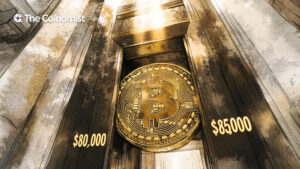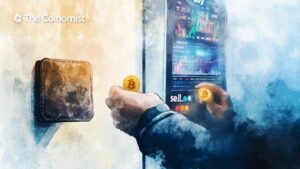Success of Ukrainian crypto project disBalancer in cyberwar

DisBalancer is a Ukrainian crypto security project, which launched the Liberator app back in March to fight against disinformation in cyberwar and make DDos attacks on russian propaganda resources. What results have been achieved?
On this page
The Liberator app targets propaganda websites that support the Putin regime, spread fake news, and promote violence in Ukraine.
147,000 people have installed Liberator since its launch. The maximum number of cyberwarriors exceeded 34,000 users. More than 3,000 people use the application at press time.
The disBalancer website provides statistics for six months of Liberator operation (from March to August). This data shows that the program attacked 641 enemy resources. Attack vectors comprised 34% vital resources, 30% infrastructural services, 23% media, 11% government structures, 1% fake donation resources, and 1% russian sabotage and espionage groups.
The application implements 4 attack methods, and the average number of daily active users amounts to 4,100 people.
users amounts to 4,100 people.
Liberator app statistics. Source: disBalancer.
The resources targeted by DDoS attacks include (written with a lowercase letter, yes): fsb, sberbank, the ministries of finance, justice, energy, the propaganda website russia today, channel one, kommersant, vtb bank, and many others.
In May, disBalancer developers upgraded Liberator by adding a Multi-target feature to make attacks more powerful and to be able to hit multiple websites at once. With multi-targeting, users can also customize the process themselves, so it's more effective.
Attacking has become simpler and quicker thanks to the most recent Liberator infrastructure update. Clients are now synchronized with servers in 10 seconds instead of the previous 5 minutes.
The disBalancer website was blocked by Roskomnadzor in the summer in an effort to somehow resist the Liberator app, and the company's operations are prohibited on the territory of a terrorist country. These actions, however, had no impact whatsoever on the crypto project's work. Cyberwarriors continue fighting the occupiers in cyberwar and carrying out DDoS attacks on russian websites.
The global goal is to launch the app on 100,000 computers at a time. This amount of attackers is required to deal the enemy's Internet space a crushing blow. The cyberattack is typically more effective when more users use the application.
DisBalancer homepage.
How to install the Liberator app?
Follow these instructions if you want to become one of the cyberwarriors to disable the main russian websites that are engaged in military activities.
Download the Liberator app from the official disBalancer website. It is available for all operating systems.
If you use Windows, disable your antivirus program for a while, or add Liberator files to the list of apps it does not block. Since Liberator is a new application, certain antivirus programs can block it because it hasn't yet been added to all databases.
If you use MacOS, open a terminal and enter the following commands one by one:
? “cd” + Enter;
? “cd Downloads” + Enter;
? “chmod +x The name of the downloaded file” + Enter.
If you use Linux, open a terminal and enter the command “sudo chmod +x The name of the downloaded file” + Enter. Then type “./Name of the downloaded file” + Enter.
No matter what OS you use, make sure to turn on the VPN to hide your IP address.
After that, you can open the application and press “Start”. The DDoS attack will be activated automatically. You can go about your business while the computer hits the targets of the terrorist country.
Is it safe and legal to carry out DDoS attacks?
DisBalancer guarantees the safety of your PC and data. The project claims that its application has been approved by the Ministry of Digital Transformation of Ukraine.
The conduct of cyberwar is currently not subject to proper legal regulation, neither under independent legislation nor in the context of international law. Therefore, one can only rely on existing laws regarding DDoS attacks, which do not take into consideration the specifics of the current situation in Ukraine. Cyberattacks are considered to be crimes under prior legislation. DDoS attacks, for instance, are considered fraud in the US.
Therefore, all cyberwarriors are advised to be in Ukraine or in countries that actively support it and interrupt diplomatic and economic relations with russia.
About DisBalancer
DisBalancer is a Ukrainian decentralized cybersecurity and crypto project that performs stress testing to detect DDoS vulnerabilities and protects customer products from scammers.
The DisBalancer network acts as a warrantor, sharing unused computer power and bandwidth with services that need protection.
The main partner, and more recently the parent company of disBalancer, is Hacken, a Ukrainian auditor of blockchains and smart contracts.
Want to know more about projects that fight exploits and scammers? We recommend reading the article “10 best tokens in cybersecurity”.
DDoS attacks are on the rise!
In recent months, Ukrainians have been suffering from power outages as a result of Russian military attacks on the country's energy infrastructure. However, this should not stop fighting the aggressor in cyberwar. DDoS attacks on russian services that are important to the war effort are still relevant today!
The content on The Coinomist is for informational purposes only and should not be interpreted as financial advice. While we strive to provide accurate and up-to-date information, we do not guarantee the accuracy, completeness, or reliability of any content. Neither we accept liability for any errors or omissions in the information provided or for any financial losses incurred as a result of relying on this information. Actions based on this content are at your own risk. Always do your own research and consult a professional. See our Terms, Privacy Policy, and Disclaimers for more details.



























